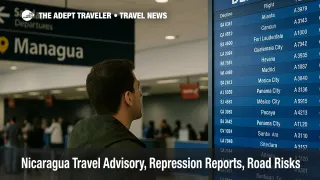Nicaragua Travel Advisory, Repression Reports, Road Risks

U.S. travelers should be aware that United Nations experts and major non governmental organizations continue to report systemic repression in Nicaragua that began with the 2018 crackdown, including enforced disappearances and arbitrary detentions. These findings explain why several governments maintain elevated advisories and why demonstrations can still flare with little notice, sometimes restricting movement near transport hubs and on key roads. If you plan to transit Managua on November 12, 2025, build extra time into airport and intercity transfers and avoid any protest activity you encounter.
The U.S. Department of State maintains a Level 3, Reconsider Travel, advisory for Nicaragua. Washington cites arbitrary enforcement of laws, risk of wrongful detention, and limited healthcare availability, and it urges travelers to avoid demonstrations, restrict unnecessary movement, and never attempt to drive through crowds or roadblocks. The U.S. Embassy in Managua repeats the same cautions in security alerts, especially when mass gatherings are expected in the capital and other cities. These notices are not abstract, they reflect recurring conditions where traffic can be halted by barricades or unannounced police operations, which can quickly complicate airport access.
Canada advises exercising a high degree of caution, noting that demonstrations and civil unrest can occur and may disrupt traffic and public transportation. Canadian guidance also stresses that foreigners are prohibited from engaging in political activity, including posts on social media that could be construed as dissent, which can lead to detention or deportation. In short, what might seem like routine expression in other countries can carry legal consequences in Nicaragua.
The United Kingdom underscores the same legal risks. British guidance states that demonstrations can turn violent and that foreigners can be arrested, detained, or deported for activities seen as political, including joining protests or attending meetings. Travelers who would not ordinarily consider themselves politically active still need to understand how broadly authorities can interpret conduct, especially in the vicinity of marches or memorial events.
Why the continued caution now
UN experts documented ongoing enforced disappearances and arbitrary detentions as recently as October 2025, and a separate UN statement in September 2025 warned that repression increasingly targets perceived opponents beyond Nicaragua's borders. Human Rights Watch has also chronicled the consolidation of power and a pattern of abuses linked to the state response since 2018. These assessments paint a consistent picture, and they support the operational advice that travelers should minimize exposure to gatherings and keep movement plans flexible.
Background, how demonstrations affect movement
In Nicaragua, protests or commemorative dates can lead to rolling police controls, ad hoc street closures, and roadblocks that stop traffic without advance notice. When that happens near bridges, main arteries, or access roads to Augusto C. Sandino International Airport, congestion can cascade quickly. Embassy alerts routinely recommend leaving the area immediately, avoiding crowds altogether, and never attempting to push through or negotiate barricades. If you encounter an unexpected closure, the safest course is to reroute, return to a secure location, and wait for conditions to change.
Practical steps if you must travel. Keep your passport and entry documents on your person, not in checked luggage, and maintain a small reserve of cash, water, and phone power in case you have to wait out a closure. Confirm airport transfers with reputable providers that track local conditions, and ask them to plan redundant routing within Managua. Avoid photography of police or security forces. Do not comment on protests in public feeds while in country, given the stated prohibitions on political activity by foreigners. Most importantly, if you learn of planned marches or memorials in your area, adjust your schedule to complete airport transfers well before they start.
Final thoughts
The Nicaragua travel advisory remains elevated because independent monitors continue to document repression and because protests and security operations can disrupt movement with little notice. If travel is essential, treat demonstration risk as an operational constraint, avoid political contexts entirely, and build abundant buffer time for airport and intercity travel.
Sources
- Nicaragua, UN experts say continuing repression of population through enforced disappearances and arbitrary detentions
- Nicaragua, Enforced disappearances and arbitrary detentions still used, UN experts
- Nicaragua, UN Experts warn of escalating repression reaching beyond borders
- Nicaragua Travel Advisory, Level 3, Reconsider Travel
- Nicaragua, International Travel Information, Country Page
- Travel advice and advisories for Nicaragua, Government of Canada
- Nicaragua travel advice, UK Foreign, Commonwealth & Development Office
- Security Alert, Upcoming Mass Gatherings in Nicaragua, U.S. Embassy Managua
